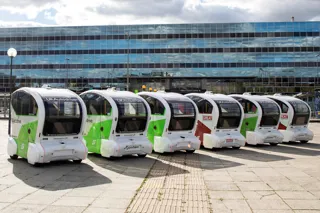Drivers of fully autonomous vehicles should not be held liable for crashes involving their cars while the technology is in charge, says the Association of British Insurers (ABI).
This is among the views submitted to the Law Commission which is helping to work out how the UK will incorporate the rules currently being decided internationally on standards for autonomous vehicles.
ABI says that once vehicles can manage all road conditions and scenarios, giving vehicle occupants permission to stop thinking about the driving task and do other things, it would be unfair to expect the driver to intervene if the on-board systems got something wrong or were unable to prevent a collision.
This means manufacturers must not be allowed to have their vehicles recognised as autonomous when a driver might still be expected to act in an emergency.
Any process which involves the vehicle handing back to someone on board must be clearly signposted and give the driver enough time to regain control safely.
Until a vehicle can handle emergency scenarios without driver intervention they can only be considered to offer advanced driver assistance. In these vehicles, drivers do remain fully responsible for the car and must be ready to take back control at any moment.
Laurenz Gerger, policy adviser for motor insurance at the ABI, said: “There will come a point when the drivers of today are effectively just passengers of a vehicle driving itself, and at that stage we want motorists to be reassured they can’t be held liable for an error made by a vehicle or a piece of on-board technology.
“Standards being set internationally, and the way they are adopted in the UK, need to enforce strict requirements to ensure vehicles aren’t rushed onto the roads under the badge of autonomous when in fact they may still need human intervention at short notice.
“Fully autonomous vehicles have the potential to radically improve road safety and insurers are heavily involved in the trials taking place around the country.
“A safe transition to automated driving requires clear definitions to help consumers understand their own and their vehicles’ responsibilities, and data must be available in the event of an accident to help insurers and the authorities understand what went wrong.”
A working party on automated, autonomous and connected cars, part of the UNECE (United Nations Economic Commission for Europe), is in the process of setting out detailed criteria vehicles will have to meet to be considered autonomous.
The UK Government’s ambition is to have the necessary legislation in place to allow fully automated vehicles on British roads from 2021, but insurers want to make sure the transition is handled as safely as possible.
The response to the Law Commission’s preliminary consultation paper on automated vehicles, submitted jointly with Thatcham Research, also emphasises the insurance industry’s high level of support for autonomous motoring given the potential benefits to road safety.






















Login to comment
Comments
No comments have been made yet.